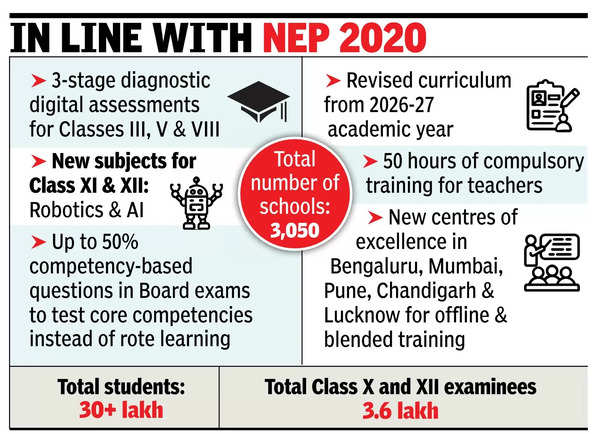AI, robotics to power big CISCE reforms | India News


NEW DELHI: The Council for the Indian School Certificate Examinations (CISCE), which conducts ICSE and ISC board exams, is gearing up for sweeping reforms with introduction of robotics and artificial intelligence as subjects for students of Classes XI and XII from 2025-26.
At elementary level, these subjects will be offered in an integrated approach, where computer science will also include AI and coding.
Another notable introduction will be a holistic progress card, which will provide a 360-degree assessment of students’ progress in achieving learning outcomes. The changes will include increasing competency-based questions for Board exams starting with 25% in 2025 to 50% in 2027, and curriculum revision based on NCERT’s National Curriculum Framework, among others.

The changes targeted at bringing CISCE’s academic and administrative practices in line with National Education Policy 2020, will impact over 30 lakh school students across country. One of the key initiatives is introduction of three-stage non-retaining digital assessments for Classes III, V, and VIII, starting from 2025-26 academic session. Envisioned in NE, these assessments will serve as diagnostic tools for remediation and identifying gifted students.
Joseph Emmanuel, CEO & secretary of CISCE, said, “This approach, integrating humanities, arts, and STEM subjects, has shown positive outcomes, including increased creativity, innovation, critical thinking, & higher-order thinking capacities.”
A major shift will be seen in assessment, with the initiation of competency-based education from 2025. In Board exams, 25% questions will be competency-based in 2025, increasing to 40% in 2026 and 50% in 2027. The aim is to test core competencies rather than memorised facts, making Classes X and XII Board exams “easier”.
CISCE will also roll out a school improvement plan from next year . Emmanuel further added, “The larger vision is for high-performing schools to voluntarily work with state govts to improve quality of govt schools.”



